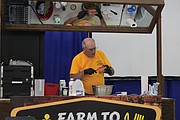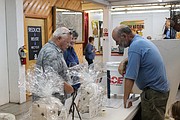Yakima beekeeper group provides bee education
YAKIMA — Worker bees gathered around the queen bee as she goes about her job of laying bees. This scene was on display for visitors of the Central Washington State Fair to witness. The display was provided by the Central Washington Beekeepers Association.
The association started in 2009, thanks to the Central Washington State Fair. At that time, local beekeeping clubs had disbanded. The fair wanted to bring bees and beekeeping back to the fair. They approached a local beekeeper.
“Their booth consisted primarily of an extracting demonstration each day at 4 p.m. and a clipboard asking if anyone would be interested in forming a local beekeeping club,” said Clifford Peterson, Central Washington Beekeepers Association Vice President. “Immediately after the Fair and throughout that winter, about 12 individuals, most of whom were not yet beekeepers, met regularly writing our constitution and taking care of other organizational necessities and in April 2010 submitted the paperwork to the state and officially became the Central Washington Beekeepers Association.”
The mission of the group is to help area beekeepers foster relationships, give beekeepers a time to share ideas and improve their methods of beekeeping, to educate the public about honey bees and what beekeepers do and to help those interested in getting their own hive of bees.
In keeping with their mission, the group has a meeting each month where they have educational presentations and allow beekeepers and potential beekeepers to network.
“During the warmer months we have regular field days where members have actual hands-on supervised experience with hive inspections and working with bees,” Peterson said. “We have members who give presentations at schools, churches, and organizations; really to anyone who asks. We manage the apiary at Yakima Area Arboretum.”
They also participate in the Yakima Area Arboretum’s ArborFest and the Central Washington State Fair. They normally hold a class for beginning beekeepers in the spring, in cooperation with the Yakima Area Arboretum.
Peterson was one of those individuals who was not yet a beekeeper who signed up to join the beekeeping club in 2009.
“My fascination with bees began about 50 years before that,” Peterson said. “During my ten years of beekeeping I’ve ranged from two to 20 hives, but generally keep about five active hives a year.”
His advice to those interested in becoming a beekeeper is to read.
“Read everything you can find on bees and beekeeping,” Peterson said. “There is both an art and a science to beekeeping. The science part is why we do what we do; the art is how we do it. Every beekeeper will include in their teachings the techniques they use.”
Peterson said that rarely is there only one way to do things in beekeeping. What works for one beekeeper may not work for another. He suggests getting as many different opinions and viewpoints as possible.
“The secret of being a successful beekeeper is to understand honey bee biology and behavior and manipulating their environment so what the bees will be doing naturally will be a benefit to both the bees and the beekeeper,” Peterson said. “As one reads multiple books on beginning beekeeping, one thing they should notice that they all agree on is that the best way to get off on the right foot is to join your local beekeepers association.”
Beekeeping takes both time and resources. Those interested in getting their own hive need to consider the time they will need to dedicate to their bees.
“Why do you want to become a beekeeper?” Peterson said. “The answer doesn’t really matter to anyone but you. There are probably almost as many different answers as there are beekeepers. What really matters is that your reason is important enough for you that you are willing to make that commitment. The average backyard beekeeper only keeps bees for five years.”
Peterson suggests that if a lack of time is a factor, hosting someone’s hive may be an option.
Another factor to consider is getting stung. A beekeeper is guaranteed to get stung. Planting a bee-friendly garden should also be considered.
When it comes to removing honey from the comb, there are a number of ways to go about it. An extractor is one of the quickest. Peterson said that a lot of local beekeeping organizations have an extractor that their members can use. If an extractor can’t be borrowed, honey removal equipment will need to be purchased. The cost of equipment that will be needed should factor into one’s decision to keep bees.
If time or means don’t allow for the keeping of a personal beehive, there are other ways to still be a part of bees.
“Everyone can ‘get into bees’ by recognizing all of the benefits they are to man from pollination of the food we eat to the beeswax they produce we use in creams, balms, lotions, and so many other products,” Peterson said. “Something as simple as buying raw honey from your local beekeeper benefits your local honeybee population.”
The Central Washington Beekeepers Association meets the first Tuesday of each month from 6 to 8 p.m. at the Astria Regional Medical Center, 110 South Ninth Avenue in Yakima, in the Dr. Michael Murphy Auditorium. All meetings are open to the public and everyone is invited to attend. To learn more, visit yakimabees.org.
Rachal Pinkerton may be reached via email at rpinkerton@suntribunenews.com







